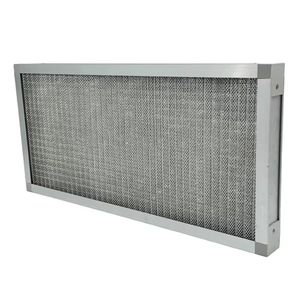
All categories
Featured selections
Trade Assurance
Buyer Central
Help Center
Get the app
Become a supplier

(2975 products available)

































The split air conditioner filter is an integral component in the HVAC system, playing a pivotal role in air quality control and system efficiency. These filters are designed to trap and remove particles from the air, ensuring that the air conditioner operates at its peak performance, providing clean air while protecting the system's internals from dust accumulation and potential damage.
Diverse types of split air conditioner filters cater to various needs and preferences. For instance, the mini split air filters are compact and suitable for smaller units, while options like the carrier flexicool convertible 4 in 1 offer versatility for larger systems. Filters also vary in terms of filtration level; some are designed for basic particle removal, while others, such as HEPA filters, target much finer particles, providing a higher level of air purification suitable for environments with stringent air quality requirements.
The structure of a split air conditioner filter is a complex assembly designed for optimal air purification. It typically includes a frame that holds the filtration media in place. The media may consist of layered meshes or pleated materials that increase the surface area for trapping particles. In operation, the air is drawn through the filter, and as it passes through the media, particles are captured. Some filters incorporate multiple layers with different densities to capture a broader range of particle sizes.
The materials used in split ac filters are selected for their filtration efficiency and durability. Polypropylene, polyester, and fiberglass are common due to their ability to trap particles without restricting airflow significantly. Some filters include activated carbon to absorb odors and gases. The choice of material affects the filter's performance, with some materials offering higher dust holding capacity, contributing to longer service intervals and improved air quality.
Split air conditioner filters are utilized across various industries, from commercial buildings and hotels to hospitals and data centers. In the hospitality industry, for example, a clean and odor-free environment is paramount for guest satisfaction, and high-quality filters like the lg ps q19ynxe can help achieve this. In healthcare settings, filters with higher efficiency ratings are crucial for removing potential pathogens and allergens from the air, contributing to a safer environment for patients and staff.
The primary function of a split air conditioner filter is to clean the air that circulates through the air conditioning system. It is designed to capture a wide range of airborne particles, including dust, pollen, mold spores, and sometimes even bacteria, depending on the filter's rating. The mitsubishi aircon filter, for example, is engineered to perform these tasks with high efficiency, ensuring that the air output is of the highest quality.
Distinct features of split air conditioner filters include their filtration efficiency ratings, such as MERV or HEPA, indicating their ability to capture fine particles. Some filters, like the fujitsu ac filter, boast antimicrobial treatments that inhibit the growth of mold and bacteria on the filter itself. The unique selling points of these filters often lie in their specific design elements, such as low airflow resistance for energy efficiency or high dust holding capacity for less frequent changes.
The benefits of using a high-quality split air conditioner filter are manifold. They extend the life of the air conditioning unit by preventing dust buildup on critical components, improve indoor air quality for health benefits, and can even reduce energy costs by maintaining efficient system operation. For instance, the godrej 18ttc3 filter is known for its energy-efficient performance, which translates to cost savings over time.
Effective operation of a split air conditioner filter involves proper installation and regular maintenance. The filter should be inserted correctly into the slot, ensuring a snug fit to prevent unfiltered air from bypassing the filter. Maintenance typically involves regular cleaning or replacement, with the frequency depending on the environment and usage. For example, filters in a dusty industrial setting may need more frequent attention than those in a cleaner office environment.
The target audience for split air conditioner filters includes both residential and commercial users who prioritize air quality and system efficiency. For residential users, products like the lg ps q19cnze are ideal for their balance of performance and cost-effectiveness. Commercial users, such as facility managers of large buildings, might prefer a product like the ar18by3yata for its high dust holding capacity and longer life, reducing maintenance frequency and costs.
Choosing the right air conditioner filter involves assessing the specific needs of the environment. Factors to consider include the level of air pollution, the presence of pets or smokers, and any allergies among the building occupants. It's also important to match the filter size and type to the air conditioning unit, ensuring compatibility and optimal performance.
Installing a split air conditioner filter is typically a straightforward process. The filter should be slid into the designated slot, following the airflow direction indicated on the filter. Maintenance involves regular inspection, cleaning, or replacement. A filter in a standard home might need to be changed every 90 days, while in more demanding environments, a monthly change might be necessary.
Signs that an air conditioner filter needs replacing include noticeable reductions in air flow, increased energy bills, and visible dust buildup on the filter. Unusual system noises or smells can also indicate that the filter is clogged and requires attention.
Yes, the right air conditioner filter can improve energy efficiency. A clean filter allows for better airflow and reduces the strain on the air conditioner, leading to lower energy consumption and cost savings.
Air conditioner filters should be changed regularly, with the frequency depending on the environment and usage. Residential filters typically require a change every 90 days, while commercial or industrial environments may necessitate monthly changes.